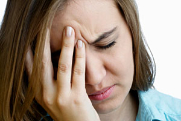
TIPS TO HELP YOU RELAX
If you leave work and feel exhausted when you arrive at home, then you
need to unwind so that you have the energy and time that a career and
family require. Use these tips to help you relax in the evening.
- Try to plan your workday so that the major tasks are accomplished early and that the less stressing tasks are towards the end , this enables you to feel more relaxed for your commute home.
- Use the time when you are commuting to reflect about your day and how you can make tomorrow more organized.
- Try to make thirty minutes for exercise.
- Try to make your childrens' homework, mealtimes,bathtimes, and bedtimes a ritual to enable them to have a regular schedule and to allow you time for your exercise.
- Avoid late, heavy, fatty meals when possible as these may interfere with a good night's sleep.
- Do not fall asleep watching television.
- Try a nice warm bath after your exercise and go to bed with a clear understanding of what time you need to awake in the morning to avoid being tardy for work or school.
- Make a big effort to get eight hours of sleep so that you will operate with energy.
EXERCISE AND FITNESS
Aerobic exercise is an excellent way to keep in shape. We recommend three to five times a week at least for thirty minutes duration. If you are not certain you can handle this level of activity you should consult your primary care physician . These activities include walking, running or jogging, cycling, swimming, and aerobic dancing.
Remember to do warm-up stretches of your arms and legs before you begin your aerobic exercises.
If you do acquire a sports related injury remember to (REST)--- Restrict movement, (ICE)----apply a cold compresses, (COMPRESSION)---ace wrap pressure bandage, (ELEVATION)--keep the injured part raised above the heart level. If the swelling, discoloration, or pain are severe consult your primary care physician. NUTRITION
It is very important that fruits and vegetables make up a significant portion of your diet (the very fresh ones being the best), to enable your body to acquire proper vitamins and minerals essential for good health
Do not make fast foods, sugars, and fats the mainstay of your diet because these will lead to obesity and lack of energy when eaten in excess.
You can enjoy complex carbohydrates such as potatoes, rice, pasta , whole grain breads and cereals.
Lower fat yogurt, cheese, and milk are excellent sources of calcium.
When you need to lower your sugar intake, try to reduce it by one-half, eat fresh fruits that are naturally sweet, use recipes that substitute fruit juices for sugar and use fruit purees instead of jelly. TENSION HEADACHES & STRESS
Lie down in a quiet, dark room with a cool wash cloth over your eyes.
Massage---you can do this yourself or have another person do this especially to the neck, shoulders, and scalp.
Ice packs to the back of the neck.
Try relaxing your muscles -first tense a muscle group then relax it then go to a different muscle group trying the same thing, now relax your whole body DEEP BREATHING
This is a great way to help relieve stress and relax-try it ! It can be done anywhere and at anytime and it is free.
Sit or lie down if possible, slowly take in a deep breath through your nostrils and feel the air as it moves in. Very slowly allow the air to leave through pursed lips and feel it move out. This should be done about two to three minutes. It is really more relaxing if you can think of a meadow with flowers, sunrise, or the ocean breeze.
How To Lose Weight And Maintain Energy

If you have excess body fat that you want to lose, you must understand that diets don't work! In order to lose weight healthfully and successfully keep it off, you should look at your eating. After all, eating contributes to weight problems...particularly the over-eating that commonly occurs after blowing a strict diet.
Strict diets teach you willpower. Strict diets leave you feeling deprived of one of life's pleasures - food. Rather than diet, you should learn how to healthfully eat diet portions of any food that you currently enjoy and would like to eat throughout the rest of your life. Healthful eating offers more long-term success than crash dieting. Healthful eating also ensures adequate vitamins, minerals, protein and carbohydrates--the nutrients you need to exercise at your best.
The following eating tips can help you successfully lose weight plus have energy to train hard and exercise at your best. Expect to gradually lose weight at a realistic rate of one-half to three pounds per week depending on your body size and total amount of fat you have to lose.
Twelve Steps for Successful Weight Reduction
- Step One
Write down what you typically eat in a day, then evaluate your meal patterns and eating habits. Do you nibble all afternoon? Devour huge dinners? Munch-out at night? If you eat very few calories during the day but then over-eat at night, experiment with eating a bigger breakfast, lunch and a planned afternoon snack. Then you will be less hungry at night and better able to eat a smaller dinner. By giving yourself permission to eat more calories during the day, you will not only have more energy to exercise, you will also prevent yourself from getting too hungry. Generally speaking, once people are ravenously hungry, they don't care about what they eat nor how much and can too easily over-eat.
- Step Two
If you overeat when you are stressed, nervous or lonely, remember that no amount of food will satisfy you. You really need a hug and human comforting. Food is only fuel. It will not resolve your problems.
- Step Three
To lose weight appropriately, you should know your calorie budget. To determine the number of calories for your reduction diet, you first need to estimate your maintenance calories:Multiply your desired weight by 10 to determine your resting metabolic rate (the amount of calories you need to simply lay in bed all day and breathe). For example, if your target weight is 120 pounds, your resting metabolic rate is about 1,200 calories. You burn off these calories even if your are injured or taking a rest day from exercise.
Add another third to half of that number for your general daily activity excluding your specific training or exercise program. If your are mostly sitting, studying, or working at a desk, you need fewer calories than if you are active during the day (i.e. going up and down stairs, walking around, doing errands). For example, a 120 pound mother with 2 children is quite active and burns approximately: 1,200 calories (resting metabolism) + 600 calories (general activity) = 1,800 calories (without exercise).
Next, add on calories burned off during your exercise program. Here is the calorie expenditure for some popular sports, based upon weight and calories burned per minute of activity:
Calories burned per minute(by body weight)Activity 110 lbs130 lbs150 lbs170 lbsBiking, 13 mph 8.510.011.513.0Running, 8 min/mile 10.812.514.216.0Squash 10.612.514.416.3Swimming, hard 7.89.210.612.0Walking, normal pace 4.04.75.46.2NOTE: This is a rough estimate of your calorie needs. You may burn more calories or fewer calories, depending on many factors unique to your body. For example, fidgeters need more calories than mellow folks! A registered dietitian can help you more accurately determine your actual energy needs.
- Step Four
Subtract 20% of your maintenance calories to determine an appropriate calorie target for weight loss. For example, if you maintain your weight on about 2,000 calories, you should plan to lose weight on about 1,600 calories. Note that individuals of a more petite body structure will subtract fewer calories than average sized individuals. If you cut back more than 20%, you will likely become ravenously hungry and put yourself at high risk of blowing your diet.
- Step Five
Organize your eating into a balanced plan. For example, divide your 1,600 calorie diet into three meals plus snacks, such as: breakfast - 500 calories; lunch - 500 calories; afternoon snack - 100 calories; dinner - 500 calories. By eating the majority of your calories during the day, you will have energy to exercise at your best. You will also be able to (easily) "diet" at night because you will be less hungry.
Remember: you will not gain weight by eating a substantial breakfast or lunch. You will gain weight, however, if you skimp on these meals, get too hungry and then overeat during the evening!
- Step Six
Eat slowly. Overweight people tend to eat faster than their normal-weight counterparts. Your brain needs about 20 minutes to receive the signal that you have eaten your fill. No matter how much you consume during these twenty minutes, the satiety signal won't move any faster. Hence, you should try to pace your eating. Practice chewing slowly, putting down the fork between bites rather than eating nonstop, and tasting and savoring the food.
- Step Seven
Once a week, relax and enjoy a piece of birthday cake, a special Sunday breakfast or a planned treat. This will give you incentive to maintain your reducing program when tempted at other times. When enjoying this treat, be sure to eat it slowly to fully enjoy the taste. After all, the best part about food is the taste.
- Step Eight
Keep away from food sources that tempt you. For example, read the newspaper in the living room rather than the kitchen. Avoid jogging past the bakery. Stand away from the buffet table at a party. By keeping food out of sight, you will be more likely to keep it out of mind -- and out of your mouth!
- Step Nine
If you tend to eat because you are bored, stressed, tired or lonely, make a list of ten non-food activities that you can do instead of eating: water the plants, take a bath, call a friend, write letters, go for a walk, go to sleep, etc.. If you eat because you are stressed, take steps to resolve the real problem. Recognize that no amount of food will resolve the stress. Learn how to handle stress and anxiety without overeating.
- Step Ten
Think positive. Every morning before you get out of bed, visualize yourself eating appropriately and achieving your nutrition goals. This will help you start the day with a positive attitude. Continually remind yourself that you would rather be leaner than overeat
- Step Eleven
Measure success by looking at yourself naked in the mirror. If you see, and pinch, less fat, you have less fat! If you weigh yourself, do so once a week first thing in the morning, after you have gone to the bathroom and before you have eaten. Don't weigh yourself after a workout or at night -- that gives a false weight! Remember that if you are starting an exercise program, you may gain pounds of muscle while you lose pounds of fat. The scale may read the same weight, but your body will be different.
- Step Twelve
Be proud of your healthy eating patterns and keep reminding yourself that when you eat well, you not only feel better but you also feel better about yourself. Plus, you have enough energy to exercise and enjoy life.

WILMINGTON URGENT CARE & FAMILY CLINIC
more info
URGENT CARE ONE
more info
SAN PEDRO URGENT CARE PARK PLAZA
more info
SAN PEDRO URGENT CARE
more info
MARQUE URGENT CARE - SOUTH GATE
more info
LA VERNE MEDICAL URGENT CARE
more info
HOLY CROSS URGENT CARE INC
more info
GLENOAKS URGENT CARE MEDICAL GROUP
more info
